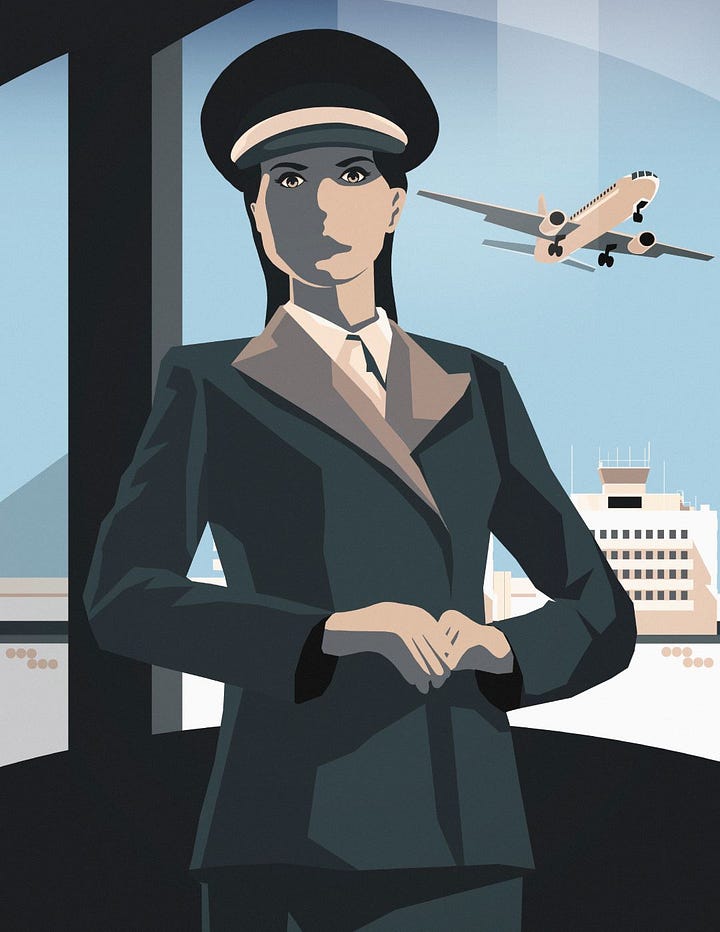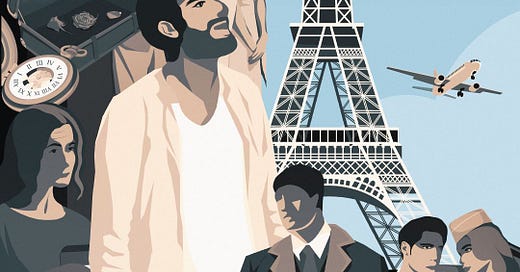Taking Flight: Exploring Travel and Liminal Spaces in the Opera 'Flight'
Some questions and thoughts as you approach the opera. For students of all ages.

Jonathan Dove’s opera Flight is a modern masterpiece that resonates deeply with audiences by exploring universal themes of travel, human connection, and transformation. Set in the microcosm of an airport terminal, the opera unfolds in a space where people pause between journeys, their lives briefly intersecting. For high school students studying Flight, this essay will delve into the opera’s rich exploration of travel and liminal spaces, illustrating how these ideas connect to our lives and the broader human experience.
The Airport as a Liminal Space
An airport is an unusual place. It’s not quite a destination, but it’s also not a place to stay. In the opera, the terminal becomes a metaphorical liminal space—a threshold between worlds where ordinary rules and routines are suspended. Passengers are stuck between the familiar comfort of home and the unknown adventure that lies ahead.

In Flight, this transitional space reflects the characters’ emotional states. Each person at the terminal faces their own crossroads: the Steward and Stewardess wrestle with their superficial relationship, a couple embarks on a tense journey to reignite their marriage, and the Controller surveys it all from her isolated perch. At the centre is the Refugee, who lives permanently in this liminal state, trapped in the airport because he cannot enter the country but has nowhere else to go.
For students, this concept of liminal space may feel familiar. High school itself is a transitional period—a bridge between childhood and adulthood. Just like the airport in Flight, it’s a time and place where you prepare for the future while grappling with uncertainty and change.
Discussion Questions:
How does the airport in Flight reflect the characters' emotional and personal struggles?
Can you think of other examples of liminal spaces in literature, films, or your own life?
In what ways does high school serve as a liminal space, and how do you navigate it?
Travel as Transformation
Travel in Flight serves as both a literal and symbolic journey. For the characters, it is not just about moving from one place to another; it’s about self-discovery and change. By the end of the opera, many of the characters have grown emotionally or gained new perspectives. For example, the Older Woman, who spends much of the opera chasing a younger lover who never arrives, learns to accept her own worth. The Controller, initially detached and distant, is deeply moved by the Refugee’s plight, highlighting the transformative power of empathy.


This idea of transformation through travel is a powerful metaphor for personal growth. When we travel, whether physically or emotionally, we challenge ourselves to step outside of our comfort zones. Similarly, high school students navigating friendships, academic pressures, and future aspirations are on their own journeys of self-discovery.
Discussion Questions:
Which character’s transformation in Flight do you find the most compelling, and why?
Have you ever experienced personal growth through travel or a significant change in your life? Share an example.
What does the opera suggest about the importance of empathy in personal transformation?
The Refugee’s Story: A Mirror to the World
One of the most poignant aspects of Flight is the Refugee’s story. Inspired by the real-life experience of Mehran Karimi Nasseri, who lived in Paris’ Charles de Gaulle Airport for 18 years, the Refugee’s situation raises important questions about belonging and the human need for a home. He is a tragic figure, stuck in a liminal space indefinitely, but his resilience and humanity make him deeply relatable.

For today’s students, the Refugee’s story is a powerful reminder of the challenges faced by displaced individuals around the world. It invites reflection on issues of immigration, global inequality, and the idea of home. His story also asks us to consider how we treat those who are marginalized, encouraging empathy and action in our own lives.
Discussion Questions:
How does the Refugee’s story connect to current events about immigration and displacement?
What emotions did you feel while learning about the Refugee’s character, and why?
How does the Refugee’s resilience inspire us to think differently about our own challenges?
Music as a Journey
The music in Flight mirrors the themes of travel and liminality. Jonathan Dove’s score blends contemporary operatic styles with soaring, lyrical melodies that evoke the excitement and tension of air travel. The soundscape shifts seamlessly between moments of humour, drama, and poignancy, much like the unpredictable nature of human encounters in an airport.
For students, listening closely to how the music interacts with the story can deepen their understanding of the characters’ journeys. The shimmering strings and dynamic rhythms create a sense of movement, while moments of stillness in the music capture the vulnerability and introspection of the characters.


Discussion Questions:
How does the music in Flight reflect the characters’ emotional journeys?
Can you identify specific musical moments in Flight that stood out to you? Why did they resonate?
How does music enhance storytelling in operas and other forms of media?
Why Flight Matters
Flight is more than an opera about an airport. It’s a story about the human condition—about how we navigate the spaces between where we are and where we want to be. It’s a reminder that, whether we’re travelling across continents or through life’s milestones, we’re all in motion, seeking connection and purpose.

For high school students, Flight offers a chance to reflect on their own journeys. It challenges them to think about their aspirations, their relationships, and how they can approach life’s liminal moments with curiosity and courage. As they prepare to take flight into their own futures, the opera serves as both a mirror and a guide.
In the end, Flight is an invitation to embrace the unknown and find meaning in the spaces in between. It’s a story that reminds us that, no matter where we are in life, we are all travellers, moving forward, learning, and transforming along the way.
Discussion Questions:
Why do you think the opera Flight remains relevant to modern audiences?
How does the idea of “taking flight” connect to your personal goals and dreams?
What lessons from Flight can you apply to your own life, especially during times of change?
Books, Movies, and TV Shows Inspired by Flight or Exploring Similar Themes
For those interested in delving deeper into the themes of travel, transformation, and liminal spaces explored in Flight, here are some recommended works:
Books:
The Road by Cormac McCarthy
The Refugees by Viet Thanh Nguyen
Movies:
The Terminal (2004), directed by Steven Spielberg
Lost in Translation (2003), directed by Sofia Coppola
Wings of Desire (1987), directed by Wim Wenders
TV Shows:
The Leftovers (2014-2017), created by Damon Lindelof
Lost (2004-2010), created by J.J. Abrams, Jeffrey Lieber, and Damon Lindelof
Station Eleven (2021), based on the novel by Emily St. John Mandel
These works echo the spirit of Flight by exploring human connection, the meaning of home, and the challenges of navigating life’s in-between moments. They provide further avenues for reflection and discussion on the themes presented in the opera.




